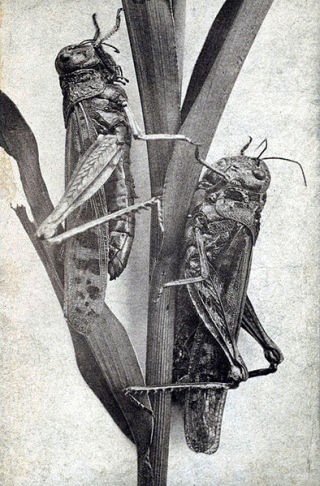Good morning, Whitewater.
Saturday in town will be mostly cloudy, with a high of eighty-three and west winds of five to ten mph.

On this day in 1931, grasshoppers torment the Midwest:
…a swarm of grasshoppers descends on crops throughout the American heartland, devastating millions of acres. Iowa, Nebraska and South Dakota, already in the midst of a bad drought, suffered tremendously from this disaster.
Since the very beginning of agriculture, people have struggled to prevent insects from eating their crops. Locusts and grasshoppers, insect cousins, are among the most feared pests. A plague of these insects can occur when conditions cause their populations to suddenly explode. Usually this happens under drought or very dry conditions, since their egg pods are vulnerable to fungus in wet soil. When the soil is very dry, swarms can develop.
Professor Jeff Lockwood of Wyoming describes being in a swarm as follows, They explode from beneath your feet. There’s sort of a rolling wave that forms out it front of you. They hit up against your body and cling against your clothes. It’s almost like being immersed in a gigantic living being. Locusts and grasshoppers undergo a significant transformation when they become part of a swarm. Their wings and jaws grow, enabling them to travel greater distances and increasing their appetite.
The July 1931 swarm was said to be so thick that it blocked out the sun and one could shovel the grasshoppers with a scoop. Cornstalks were eaten to the ground and fields left completely bare. Since the early 1930s, swarms have not been seen in the United States. However, North Africa and parts of the Middle East continue to experience problems with insect swarms, which sometimes includes as many as 1 billion bugs.
On 7.26.1865, regiments from Wisconsin muster out:
The 37th and 38th Wisconsin Infantry regiments mustered out. The 37th had spent its 14-month-long term of service in and around Washington D.C. It participated in the Siege of Petersburg and the Appomattox Campaign in pursuit of General Lee’s army. It lost 247 men during service. The 38th served in the same campaigns as the 37th but was also on duty at Arsenal, Washington, during trial and execution of President Lincoln’s assassins. It lost 113 men during service.
